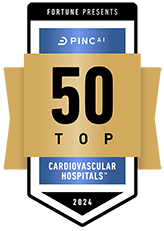Amyloidosis describes a group of diseases caused by deposits of amyloid fibrils in the body’s organs. Amyloid fibrils are normal proteins that undergo changes and fold into slender fibers. The build-up of these inflexible protein fibers can ultimately lead to organ decline.
Cardiac amyloidosis is when amyloid fibrils are deposited in the heart. The fibrils make it difficult for the heart to expand and contract. This limits the heart's ability to pump and circulate blood effectively. You may hear the condition referred to as "stiff heart" due to the reduced elasticity of the heart muscle.
There are different types of amyloidosis, which can affect the heart, lungs, kidneys, skin, eyes, digestive tract and nervous system. Those most commonly affecting the heart include light-chain amyloidosis (AL amyloidosis) and transthyretin amyloidosis (ATTR). AL is the most common type of amyloidosis in the U.S. and is caused by abnormal plasma cells. ATTR amyloidosis can be the result of a hereditary gene mutation or can occur sporadically.
What Are the Symptoms of Cardiac Amyloidosis?
Common symptoms of cardiac amyloidosis can include:
- Abnormal heart rhythm (arrhythmia, such as atrial fibrillation or AFib)
- Chest pain
- Fatigue
- Shortness of breath
The amyloid fibrils can also deposit in other organ systems which can result in noncardiac symptoms such as:
- Bladder and bowel issues
- Decreased appetite
- Feeling light headed
- Limb numbness or tingling
- Nausea
- Sexual dysfunction
- Weight loss
Risk Factors and Diagnosis
Cardiac amyloidosis is considered rare, but rates are rising as we improve diagnostic techniques. It is associated with certain other conditions. Patients with multiple myeloma or monoclonal gammopathy of unknown significance (MGUS) may have increased risk of developing AL amyloidosis. Family history of hereditary ATTR amyloidosis can also increase the risk, as it is a genetic condition.
If you were diagnosed with amyloidosis in other organs or systems — such as the kidneys or nervous system, you are at risk of the same proteins depositing in your heart. You are also at a higher risk of developing cardiac amyloidosis if you are:
- Male
- Over the age of 50
Cardiac amyloidosis tests for the protein buildup in the heart tissue, as well as its effect on the body. Diagnosis methods may include:
- Blood tests, and sometimes urine tests, to look for stress in the heart
- Bone marrow biopsy or bone scans to check for abnormal plasma cell production
- Genetic screening if you have a family history
- Heart tissue biopsy
- Imaging such as an echocardiogram, cardiac MRI or nuclear imaging scan
Treatment and Life Expectancy
While there is no cure for cardiac amyloidosis, we can successfully delay or stop the progression of the disease. Early diagnosis is one of the keys to success, made possible by recent advances in diagnostic techniques.
Average life expectancy varies based on the type of cardiac amyloid (protein), how much the organs are involved and the stage at diagnosis. Based on these factors, the worst case scenario could be six months, while in some cases, life expectancy can be eight to 10 years after diagnosis. It is important to emphasize that these are general statistics; every person is an individual and may have varying outcomes.
Cardiac amyloidosis is treated based on the type of protein that is making up the amyloid fibrils. AL amyloidosis is commonly treated with chemotherapy. ATTR amyloidosis can be treated with agents designed to stabilize the TTR protein or decrease production of the protein. Our team treats heart symptoms based on therapies to alleviate the symptoms.
Our team is working to improve the long-term prognosis for cardiac amyloidosis. We have access to and are involved in clinical trials of medications that reverse the deposit of amyloid fibrils in the heart. We are also involved in trials of new therapies that suppress fibril formation.
Cardiac Specialists With Years of Experience
Within the Froedtert & MCW health network, our dedicated team specializes in diagnosing and treating cardiac and other types of amyloidosis. You also have access to specialists experienced in treating related symptoms involving your nervous system, kidneys, digestive system or eyes.
Our Cardiovascular Program continues to receive recognition as one of the top programs nationally. We are honored to provide high-quality, effective care for even the most high-risk patients.
-
Check Out Our Heart and Vascular Program Awards and Recognition
In its 2024 Specialty Excellence Awards, Healthgrades recognized Froedtert Hospital as one of America’s 50 Best Hospitals for Cardiac Surgery, one of America’s 100 Best Hospitals for Cardiac Care and one of America’s 100 Best Hospitals for Coronary Intervention, as well as other specialty achievements in various areas.

For the second year in a row, Froedtert Hospital was identified as one of the nation’s 50 Top Cardiovascular Hospitals™ according to an independent quality analysis based on a balanced scorecard provided by PINC AI™, and reported by Fortune. The hospitals recognized in the top 50 operated at lower cost and had better outcomes, recording significantly higher inpatient survival rates, fewer patients with complications, lower readmission rates and up to nearly $10,000 less in total costs per patient case. According to the study’s analysis, if all hospitals operated at the level of this year’s top performers, there could be 7,600 fewer deaths due to heart disease, 6,700 fewer bypass and angioplasty patients who suffer complications, and more than $1 billion in costs saved for the 2024 study year. Froedtert Hospital was ranked in the category of top teaching hospitals with a cardiovascular residency program. In this cohort of hospitals, Froedtert Hospital was ranked No. 4 in the country. No other hospital in Wisconsin was recognized with this national distinction.
The Society for Vascular Surgery's Vascular Quality Initiative (SVS VQI) has awarded Froedtert Hospital three out of three stars for its active participation in the Registry Participation Program. The mission of the SVS VQI is to improve patient safety and the quality of vascular care delivery by providing web-based collection, aggregation and analysis of clinical data submitted in registry format for all patients undergoing specific vascular treatments. The VQI operates 14 vascular registries.
The American Heart Association recognized Froedtert Hospital with its Get With the Guidelines® Heart Failure Gold Plus Award. In addition, the hospital was recognized on the AHA’s Target: Heart Failure(SM) Honor Roll and received the AHA’s Target: Type 2 Diabetes Honor Roll™ award.
The American Heart Association also recognized Froedtert Hospital with its Get With the Guidelines® — Coronary Artery Disease Mission: Lifeline STEMI Receiving Silver Plus and Mission: Lifeline NSTEMI Silver awards. These awards demonstrate our commitment to improving care by adhering to the latest treatment guidelines and streamlining processes to ensure timely and proper care for heart attacks.
The American Heart Association recognized Froedtert Hospital with its Get With the Guidelines® AFib Gold Award.
The Cardiovascular Intensive Care Unit (CVICU) and Neurosurgical Intensive Care Unit (NICU) at Froedtert Hospital have each received a silver-level Beacon Award for Excellence from the American Association of Critical-Care Nurses. This award recognizes unit caregivers who successfully improve patient outcomes and align practices with AACN’s six Healthy Work Environment Standards. Receiving this national three-year award with gold, silver and bronze designations, marks a significant milestone on the path to exceptional patient care and achieving a healthy work environment.





